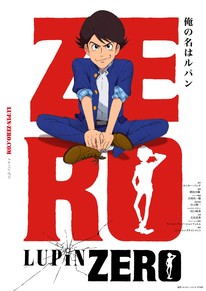Review
by Richard Eisenbeis,Lupin Zero - Episode 1
| Synopsis: |  |
||
In 1960s Japan, a young schoolboy named Lupin spends his days swindling other students, and his nights out on the town. However, the day he meets his gun-wielding hooligan schoolmate, Daisuke Jigen, everything changes. Soon the two find themselves caught up in a yakuza plot—with the life of a beautiful singer hanging in the balance. |
|||
| Review: | |||
Lupin III has always had a mysterious past. While we have learned various bits and pieces over the decades about the days before he gained the title of greatest thief in the world, the basics—his place of birth, ethnicity, and even his relationship to the original Arsène Lupin—are vague at best, and contradictory at worst. So it's kind of odd to see his early days so blatantly unveiled in this premiere episode of Lupin Zero. Contributing to this strangeness is the fact that the Lupin we see in Lupin Zero is, despite his young age, very similar to the Lupin from more recent iterations of the franchise (if half the size). He unabashedly steals from those that can afford to lose it while treating his partners in crime fairly and standing up for beautiful women in trouble. Rather than being a showcase of events formative to the man we now know him as, it seems as though he is already fully formed as a character even here in the first episode (even though he really shouldn't be, given his more amoral and cutthroat nature in the original anime adaptation). That said, this first episode does a great job of showing the genesis of Lupin and Jigen's life-long friendship. While they are thrown together by coincidence at first, it's in the middle of the episode's climactic gunfight that the two see each other for who they truly are. Lupin is a rich kid struggling with the weight of the expectations upon him. He has all the skills and smarts to become a great thief like his namesake. At the same time, he is still young enough to choose to lead a normal life instead—and there's no doubt he could find great success even on the right side of the law. But Lupin doesn't want to follow either path; hell, he doesn't want to follow any path that has been laid out for him at all. He wants to live his life by his own rules. Yet, being a kid, he is still looking for validation—someone to tell him it's okay to think that way. Jigen gives him that. As for Jigen, he's spent his formative years going from war zone to war zone, always fighting in someone else's war. Even in a supposedly peaceful country like Japan, he is used by those who hire him for their own little wars. But with Lupin he has the chance to create his own side, for the “war” to become him and Lupin against the world. Having one person he can trust—one person who can see the angles he cannot—makes all the difference. And after staging a daring rescue on the high seas against the yakuza, it's hard not to think he has chosen the winning side. In terms of the visuals, the screener I viewed was decidedly in SD quality, so I can't really speak on the quality of the animation. However, in both style and design it looks to be on par with the recent iterations of the franchise. The 1960s setting aesthetic is likewise a fun, nostalgic addition, and its clear that a lot of work went into perfecting it. On the aural size of the presentation, the music likewise fits the time period, but when it comes to the voice acting, I have to admit that hearing Jigen's deep, bassy voice coming out of a child's body was more than a little distracting on some occasions. All in all, this was an interesting first episode. On one hand, it seems a bit pointless as both young Lupin and Jigen are largely the same as their adult selves, meaning there is little to be had in the way of meaningful character development. On the other, the origin of their friendship explains a lot about why it would last for so many years to come, and the added mysteries surrounding Lupin's wealth and family are great hooks for die-hard fans of the series. So while it's not the strongest start to an anime, it's enough to make me want to see where it is going for a few episodes. |
| Grade: | |||
|
Overall : C+
Story : C+
Art : B+
Music : C+
+ The origin of Lupin and Jigen's friendship and the hints about Lupin's early life and family. |
|||
| discuss this in the forum (8 posts) | | |||
| Production Info: | ||
|
Full encyclopedia details about |
||